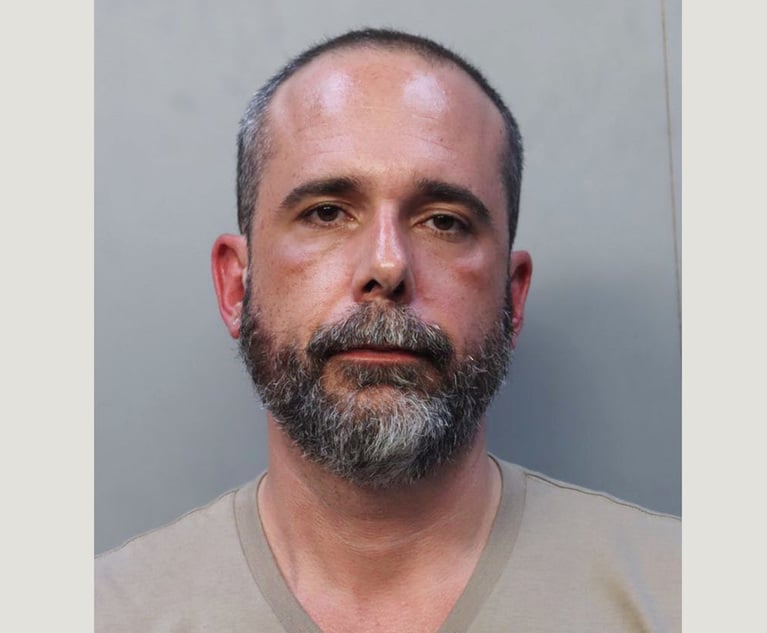South Florida Suit Challenges Controversial AOB Insurance Law That Could Affect Attorney Fees
A controversial new insurance law has found what attorneys say is likely to be the first of several challengers as a contractor's claims against its insurer survived a motion to dismiss Thursday. The case also presents a question that attorneys say is likely to reach the Florida Supreme Court.
May 14, 2020 at 02:22 PM
4 minute read
 Michael Citron, left, and Igor Hernandez, right, of MAC Legal in Hollywood, Florida. Courtesy photos.
Michael Citron, left, and Igor Hernandez, right, of MAC Legal in Hollywood, Florida. Courtesy photos.
A controversial new Florida insurance law has found its first challenger as a contractor's claims against its insurer survived a motion to dismiss Thursday in a case that presents issues likely to reach the state Supreme Court.
The lawsuit involves assignment-of-benefit agreements, or AOBs, which allow homeowners to sign over their insurance policy rights to contractors.
But the new law, Florida Statute 627.7152, passed in May 2019, blocks third parties from collecting attorney fees. It also allows insurers to offer policies that restrict or block AOBs.
Supporters say the law will curb abusive litigation, speed up repairs and save consumers the hassle of chasing claims. But critics argue it will tip the scale against policyholders.
Michael Citron and Igor Hernandez of MAC Legal in Hollywood are among those critics. They represent plaintiff KDH Architecture Inc., which sued in November 2019, claiming United Property & Casualty Insurance Co. wrongly denied coverage for $916,000 in repairs after Hurricane Irma damaged the Sun Vista Gardens Condominium Association Inc. in Tamarac.
The condominium signed over benefits to the contractor in August 2018. But defense attorney Otto Espino of Kelley Kronenberg in Miami argued the suit should be dismissed because the plaintiff allegedly failed to fulfill its pre-suit obligations. He also claimed it couldn't seek attorney fees now the new law has been enacted.
"They are not coming to United and asking for benefits for services already rendered, for tasks that have been completed, for consumables that have been consumed. They're basically saying they want $916,000 dollars prospectively for all the repairs they think they believe the property's going to need for damages that they contend are related to Hurricane Irma," Espino said. "They do stand in the shoes of the insured, and they do have those obligations to come and sit down and provide an examination under oath."
But Broward Circuit Judge Keathan Frink disagreed via Zoom, denying the defendant's motion to dismiss the case and to strike claims for attorney fees. However, the judge did note the defendant's allegations about compliance with contractual obligations could be fodder for a future summary judgment.
Kelley Kronenberg attorney Esperanza Briscoe-Diaz is handling the defendant's case and did not immediately respond to a request for comment.
The judge declined to weigh in on constitutionality, finding the statute doesn't apply because it was enacted after the benefits were assigned.
Meanwhile, plaintiff counsel Citron and Hernandez seek to certify that issue as a question of great public importance, alleging the new law violates the Florida Constitution's equal-protection clauses. They contend the law provides different rights to the insured and to the assignee, even though they're part of the same contract.
"Now, as an assignee, you're basically a second-class citizen," Hernandez said before the hearing.
The plaintiff's team is confident the question will reach the Florida Supreme Court, whether this case follows it there or not.
They point to a high court ruling from 2000, which found a similar fee-shifting statute for Personal Injury Protection, or PIP, cases violated the Florida Constitution by curbing medical providers' ability to seek attorney fees.
The defendant has 20 days to respond to the ruling.
Read more:
This content has been archived. It is available through our partners, LexisNexis® and Bloomberg Law.
To view this content, please continue to their sites.
Not a Lexis Subscriber?
Subscribe Now
Not a Bloomberg Law Subscriber?
Subscribe Now
NOT FOR REPRINT
© 2025 ALM Global, LLC, All Rights Reserved. Request academic re-use from www.copyright.com. All other uses, submit a request to [email protected]. For more information visit Asset & Logo Licensing.
You Might Like
View All
Auto Dealers Ask Court to Pump the Brakes on Scout Motors’ Florida Sales
3 minute read
Saul Ewing Loses Two Partners to Fox Rothschild, Marking Four Fla. Partner Exits in Last 13 Months
3 minute read
Law Firms Mentioned
Trending Stories
- 1States Accuse Trump of Thwarting Court's Funding Restoration Order
- 2Microsoft Becomes Latest Tech Company to Face Claims of Stealing Marketing Commissions From Influencers
- 3Coral Gables Attorney Busted for Stalking Lawyer
- 4Trump's DOJ Delays Releasing Jan. 6 FBI Agents List Under Consent Order
- 5Securities Report Says That 2024 Settlements Passed a Total of $5.2B
Who Got The Work
J. Brugh Lower of Gibbons has entered an appearance for industrial equipment supplier Devco Corporation in a pending trademark infringement lawsuit. The suit, accusing the defendant of selling knock-off Graco products, was filed Dec. 18 in New Jersey District Court by Rivkin Radler on behalf of Graco Inc. and Graco Minnesota. The case, assigned to U.S. District Judge Zahid N. Quraishi, is 3:24-cv-11294, Graco Inc. et al v. Devco Corporation.
Who Got The Work
Rebecca Maller-Stein and Kent A. Yalowitz of Arnold & Porter Kaye Scholer have entered their appearances for Hanaco Venture Capital and its executives, Lior Prosor and David Frankel, in a pending securities lawsuit. The action, filed on Dec. 24 in New York Southern District Court by Zell, Aron & Co. on behalf of Goldeneye Advisors, accuses the defendants of negligently and fraudulently managing the plaintiff's $1 million investment. The case, assigned to U.S. District Judge Vernon S. Broderick, is 1:24-cv-09918, Goldeneye Advisors, LLC v. Hanaco Venture Capital, Ltd. et al.
Who Got The Work
Attorneys from A&O Shearman has stepped in as defense counsel for Toronto-Dominion Bank and other defendants in a pending securities class action. The suit, filed Dec. 11 in New York Southern District Court by Bleichmar Fonti & Auld, accuses the defendants of concealing the bank's 'pervasive' deficiencies in regards to its compliance with the Bank Secrecy Act and the quality of its anti-money laundering controls. The case, assigned to U.S. District Judge Arun Subramanian, is 1:24-cv-09445, Gonzalez v. The Toronto-Dominion Bank et al.
Who Got The Work
Crown Castle International, a Pennsylvania company providing shared communications infrastructure, has turned to Luke D. Wolf of Gordon Rees Scully Mansukhani to fend off a pending breach-of-contract lawsuit. The court action, filed Nov. 25 in Michigan Eastern District Court by Hooper Hathaway PC on behalf of The Town Residences LLC, accuses Crown Castle of failing to transfer approximately $30,000 in utility payments from T-Mobile in breach of a roof-top lease and assignment agreement. The case, assigned to U.S. District Judge Susan K. Declercq, is 2:24-cv-13131, The Town Residences LLC v. T-Mobile US, Inc. et al.
Who Got The Work
Wilfred P. Coronato and Daniel M. Schwartz of McCarter & English have stepped in as defense counsel to Electrolux Home Products Inc. in a pending product liability lawsuit. The court action, filed Nov. 26 in New York Eastern District Court by Poulos Lopiccolo PC and Nagel Rice LLP on behalf of David Stern, alleges that the defendant's refrigerators’ drawers and shelving repeatedly break and fall apart within months after purchase. The case, assigned to U.S. District Judge Joan M. Azrack, is 2:24-cv-08204, Stern v. Electrolux Home Products, Inc.
Featured Firms
Law Offices of Gary Martin Hays & Associates, P.C.
(470) 294-1674
Law Offices of Mark E. Salomone
(857) 444-6468
Smith & Hassler
(713) 739-1250







